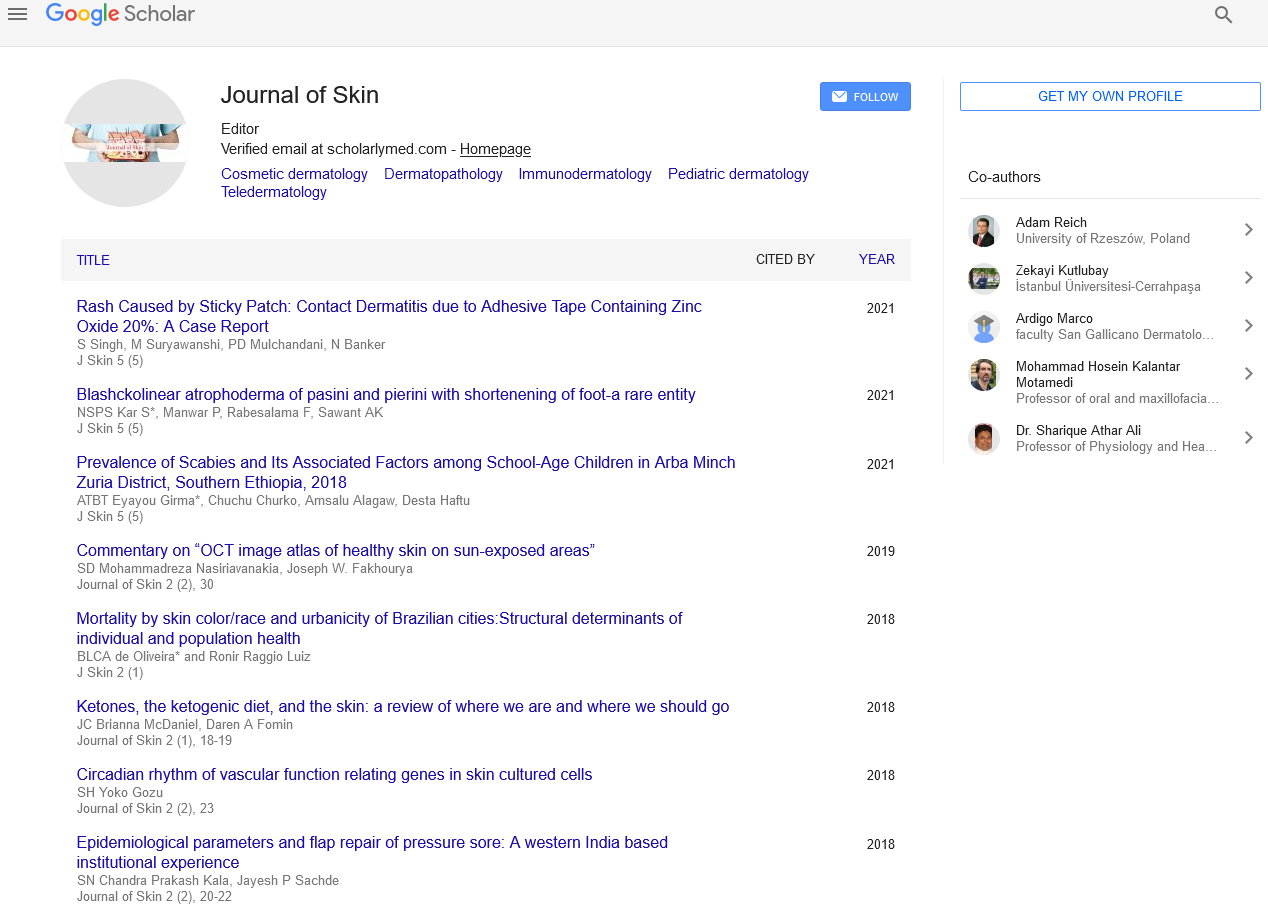Commentary on “Experience and challenges for biologic use for the treatment of moderate-to-severe psoriasis in Africa and the Middle East region”
2 Pfizer Gulf, Dubai, UAE
Received: 30-Aug-2017 Accepted Date: Sep 14, 2017; Published: 21-Sep-2017
Citation: Al Hammadi A, Tarcha N. Commentary on “Experience and challenges for biologic use for the treatment of moderate-to-severe psoriasis in Africa and the Middle East region.” J Skin. 2017;1(1):2.
This open-access article is distributed under the terms of the Creative Commons Attribution Non-Commercial License (CC BY-NC) (http://creativecommons.org/licenses/by-nc/4.0/), which permits reuse, distribution and reproduction of the article, provided that the original work is properly cited and the reuse is restricted to noncommercial purposes. For commercial reuse, contact reprints@pulsus.com
Recently in the Journal of Dermatological Treatment Al Hammadi [1] published an article describing the authors experiences, as well as some challenges faced, when using biological therapies in patients with moderateto- severe psoriasis living in Africa and the Middle East (AfME). As Al Hammadi points out, psoriasis has been designated by the World Health Organization (WHO) as a “chronic, non-communicable, painful, disfiguring and disabling disease for which there is no cure” [2]; yet awareness of this condition and how best to approach its treatment seems low in AfME.
The burden of psoriasis in the AfME region is not accurately recorded but may be higher and present with more serious features than epidemiology data in western countries suggest. Although biologic therapies for the treatment of psoriasis have been available in AfME countries for over a decade, data on their actual use are lacking, and it is believed that local experience with these therapeutic agents is scarce. This is particularly worrisome when it is remembered that use of biologics has been associated with an increased risk of incident infections or reactivation of latent ones including tuberculosis, which is endemic in many parts of AfME. Moreover, it is well known that the presence of severe psoriasis is associated with an enhanced risk of developing not only psoriatic arthritis (PsA) and inflammatory bowel disease (IBD) but also certain cancers, cardiovascular diseases including heart attack and stroke, diabetes or metabolic syndrome, obesity and depression [3], all of which are already believed highly prevalent in AfME. It is well known that moderateto- severe psoriasis responds well to biologic therapy in many patients, but the availability and use of these drugs seem restricted in AfME countries. Reasons cited for the lack of use of biologics include physician unfamiliarity, especially among non-specialists, cost and non-adherence by patients.
National or local guidelines for the treatment of psoriasis in AfME countries are glaringly lacking, with only Saudi Arabia and South Africa producing their own. Most clinicians in the region rely on US or European recommendations to inform treatment decision making — but these international guidelines do not take into account local medical, legal, religious or practical considerations relevant for AfME. Hurdles to providing adequate treatment for psoriasis patients in AfME countries are manifold. There is an urgent need for AfME-specific guidelines as well as screening programmes, standardized methodologies and availability of technology to detect anti-biologic drug antibody (ADA) formation, disease registries and patient associations and support groups. Also, clinical trials conducted in AfME patients with psoriasis would provide useful information on how different ethnic groups, which are typically underrepresented in clinical trials conducted in western countries, respond to treatments.
Local guidelines for the treatment of psoriasis and PsA specifically in the AfME region are clearly required. New screening tools for comorbidities are also needed to optimize the management of psoriasis. Physicians should be aware of the problem of non-adherence to systemic treatment in chronic diseases; drivers of non-adherence should be identified and tailored solutions adopted to improve the level of adherence. Likewise, a patientcentred approach to psoriasis care may help optimize outcomes and reduce the physical, social and economic burden of psoriasis and PsA in the AfME region.
In conclusion, psoriasis affects people in AfME at least as harshly as elsewhere in the world, and possibly more so. This chronic condition is a known risk factor for developing an array of other serious diseases and has its own hazard for an increased mortality [4]. Psoriasis also profoundly influences patients’ loss of work productivity. All these factors present an immense strain in an area of the world where there are already many social and economic problems. Biologic therapies have been definitively demonstrated to improve psoriasis symptomatology and are available in AfME. Reported experiences of clinicians working with psoriasis patients in AfME countries have been so far encouraging. The challenge from now is how to build on these foundations, improve awareness of psoriasis and expand access to biologics and other effective therapies against moderate-to-severe forms of this disease in the AfME region.
REFERENCES
- Hammadi A. Experience and challenges for biologic use for the treatment of moderate-to-severe psoriasis in Africa and the Middle East region. J Dermatol Treat. 2017;28:129-35.
- World Health Assembly. 67th World Health Assembly, World Psoriasis Day (May 24, 2014). Available at: http://apps.who.int/gb/ebwha/pdf_files/EB133/B133_R2-en.pdf. [Accessed August 2017].
- Takeshita J. Psoriasis and comorbid diseases: epidemiology. J Am Acad Dermatol. 2017;76:377-90.
- Springate DA. Incidence, prevalence and mortality of patients with psoriasis: A UK population-based cohort study. Br J Dermatol. 2017;176:650-8.





